This is the 3rd part of a 6 part series on how cutting-edge text analysis technology is helping investors mitigate the detrimental effects cognitive biases can have on their decision-making.
Breaking Free of the Herd
While confirmation bias in finance is commonplace, it’s far from the only cognitive bias to pose a major threat to quality investment decisions. Herd mentality, or equating the popularity of an idea with its quality, represents another significant challenge to objective analysis.
“Research…has shown that individuals have evolved to be overly influenced by their neighbours, rather than rely on their own instinct. As a result, groups become less responsive to changes in their natural environment,” Science Daily notes. Obviously, an investor’s ability to assess investment opportunities is impaired if they are no longer “responsive to changes in their natural environment,” particularly if they are over-responsive to the opinions of their peers.
When it comes to information that has traditionally been interpreted through qualitative means—like the tone of an earnings call—the power of herd mentality to distort analysis is even greater.
Although the presence of undue positivity or negativity surrounding a company’s outlook may influence an analyst to pay extra attention to certain elements of a company’s financial profile, an earnings beat is still an earnings beat. Quantitative financial information has the advantage of concrete definition and, therefore, can concretely contradict biases.
Language, on the other hand, is open to interpretation. Language is unstructured and qualitative, meaning popular opinion has even more sway, and the human brain can rationalize even blatant misinterpretations. It is here that the unbiased analysis offered by text analysis algorithms can be a powerful tool for investors.
Groupthink Gone Wrong
“Groupthink,” the inclination to suppress a dissenting opinion, is perhaps the most insidious form of herd mentality. The classic example of groupthink was the failure of US foreign policy decision-making during the infamous Bay of Pigs Invasion. Throughout the ordeal, President Kennedy’s cabinet constantly agreed with him in an effort to gain his favor. This behavior was not just sycophantic, it was deadly. Hundreds of soldiers died, and the mission failed, because the cabinet valued Presidential favor over facts.
When the Cuban Missile Crisis erupted just 18 months later, Kennedy was deliberately absent from key strategy meetings. As his cabinet debated, Attorney General Robert Kennedy relayed the discussion’s salient points to the President. This ensured a diversity of viewpoints would be expressed and the President would have more complete information when making policy decisions. Ultimately, Kennedy’s strategy facilitated open debate, resulting in a superior policy outcome that helped avoid nuclear war.
Obviously not exclusive to the political space, groupthink can also have a profound impact on investment decisions. For instance, it is not uncommon for portfolio managers to ask the firm’s researchers to vet a trading idea based on little more than a gut feeling. While one would hope the firm’s incentive structure would prompt the researchers to give such suggestions a thorough evaluation, the power dynamic at play often suppresses the possibility of dissent, forcing a researcher to manufacture justifications for a portfolio manager’s hunch. This is just one of the many scenarios in which the human inclination to conform can militate against clear thinking in investing. As noted above, the power of these impulses is only enhanced by situations where qualitative analysis seems like the only option.
Fortunately for today’s investors, automated textual analysis has broken the monopolistic grip human subjectivity formerly held over linguistic interpretation. From earnings calls to FOMC statements, financial professionals now have access to unbiased, comprehensive, and quantitative assessments of market-moving language. Such data can serve as an objective voice amid a sea of affirmation for a single interpretation.
The Prattle Team


